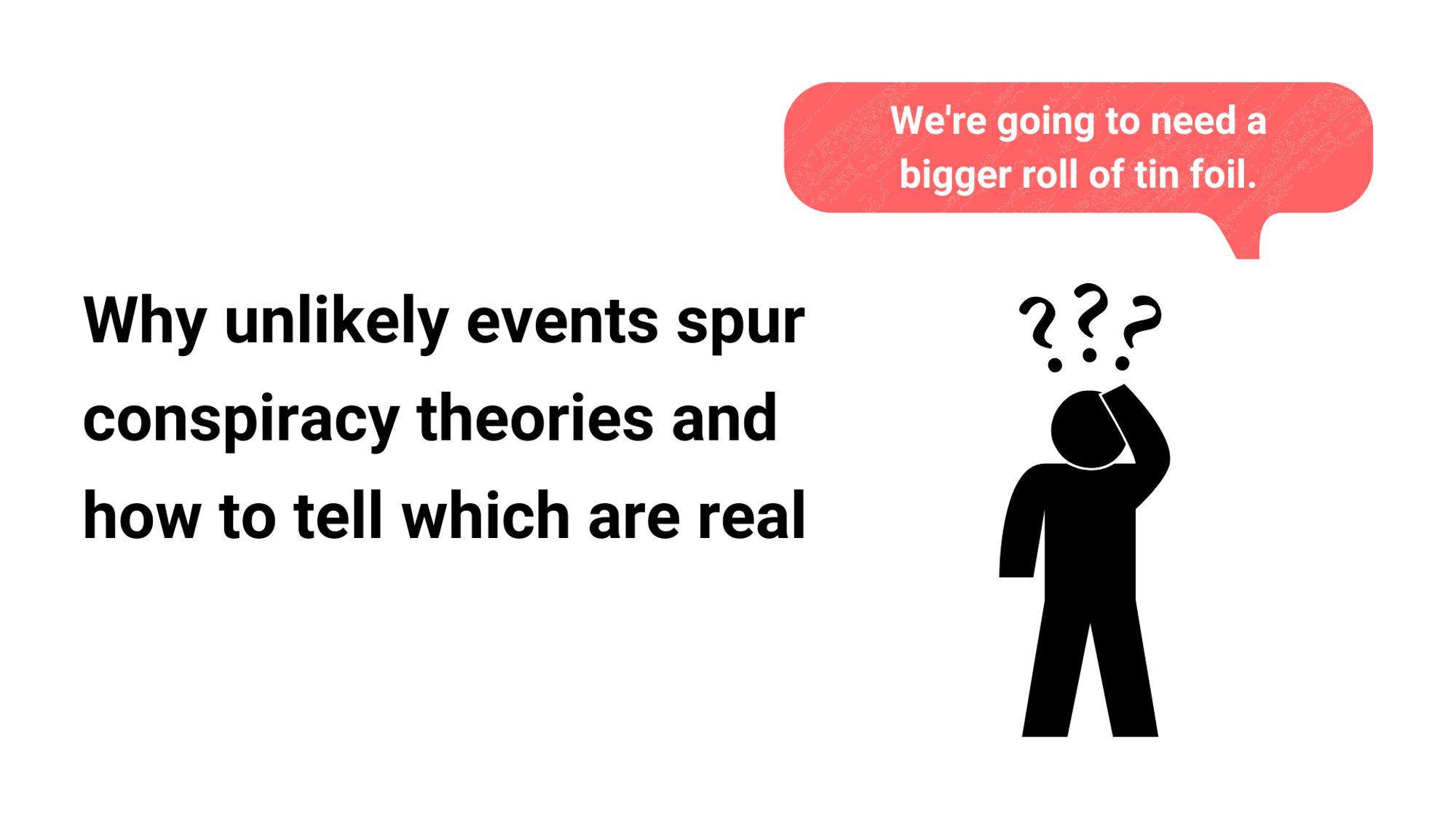
Conspiracy theories can meet an emotional need, deflect blame or responsibility, or it can be used to advance a cause.
- Conspiracy theories can help us escape inconvenient realities. They make sense of unlikely events we cannot fully understand or don't want to accept (Lewandowsky, 2021).
- They help us cope with and create a sense of control over situations where we feel powerless (Lewandowsky, 2021).
- Conspiracy theories may meet a need to feel special or different from others, and in some cases, fewer believers can make a theory more appealing (Imhoff & Lamberty, 2017).
- Conspiracy theories can be weaponized by bad actors like the KGB fabricating evidence linking the CIA to the JFK assassination and sending it to receptive audiences (Hoover, 1966; Yablokov, 2015).
Real conspiracies happen
- Volkswagen conspired to cheat emissions tests.
- NSA secretly spied on civilian internet users.
- USPHS lied to Black Americans and withheld treatment for syphilis.
- Big tobacco and fossil fuel industries deceived the public using organized disinformation.
How do we tell the difference?
We know about real conspiracies through internal industry documents, government investigations, or whistleblowers. We can explain who, what, where, when, and why. Real conspiracy theories have a few things in common:
- Real conspiracies aren't discovered in response to a big event they allegedly explain.
- Real conspiracies leave behind evidence and are not proven by showing that “something isn't right.”
- Conspiracy theories arise from hyper skepticism, over-emphasis on minute details, lack of coherence, and explain an event with omniscient insight.

Contradictory
Conspiracy theorists can simultaneously believe in mutually contradictory ideas. For example, people will sometimes argue that bad actors will still kill others with weapons besides a gun, say the shooting was staged, and then argue that the shooter was hypnotized.
These three statements lack a commitment to a coherent narrative and conflict with one another.
Overriding suspicion
Conspiratorial thinking involves self-sealing skepticism. It's not that the evidence about what happened isn't compelling; it's that their mistrust of anything authoritative prevents them from accepting anything that might disprove the theory. Only things that affirm their beliefs are reliable.
Nefarious intent
The motivations behind any presumed conspiracy are invariably nefarious. Real conspiracies have a range of motives that might be different for different parties involved. The intent might be the last thing learned about a real conspiracy. Motives are never presumed to be benign, even when they are possible.
For example, no one argues a staged shooting is to get legislative action to prevent a real one. It's always a grand plot to disarm them, even though the government has access to weapons far exceeding anything in the civilian arsenal. Theorists believe they know the motive, but have no evidence to support the belief.
Something must be wrong
Although conspiracy theorists occasionally abandon specific ideas when they become untenable, those revisions don’t change their conclusion that “something must be wrong” and the official account is based on deception. What makes the conspiracy theorist so certain is never clarified. They may have no awareness of this fatal logical flaw while overlooking simple explanations and mischaracterizing counterarguments.
Something. Must. Be. Wrong.
Persecuted victim-hero
Conspiracy theorists perceive and present themselves as the victim of organized persecution, even though there may be no evidence to support this. They also see themselves as part of a small minority brave enough to take on these imagined villainous conspirators. Conspiratorial thinking involves a self-perception of simultaneously being a victim and a hero. Chances are they are neither.
Immune to evidence
Conspiracy theories are inherently self-sealing—evidence that counters a theory is re-interpreted as originating from the conspiracy. Did the shooter buy the gun himself? Well, then they want to know where he got the money.
When you tell them, then they don't trust the answer because it's official. There is no reality where they can be wrong. Theorists often have a paradoxical belief where the stronger the evidence against an improbable theory, the more they believe it, imagining some shadowy figure wanting to dupe them. They've duped themselves.
Re-interpreting randomness
Conspiracy theorists believe nothing occurs accidentally. This can be a part of the need to feel special, which is common among believers. Events that have no relation are imagined to be significant. Something like conflicting witness accounts or unaccounted-for bullet cartridge become the basis for ignoring strong evidence. These details become a part of the conspiracy narrative.
If the weapons are expensive, and they don't know where the shooter got the money, that becomes evidence for the conspiracy story. If a door was unlocked and the shooter entered easily, this is now a part of the story rather than negligence. Anything and everything is evidence they're right.

